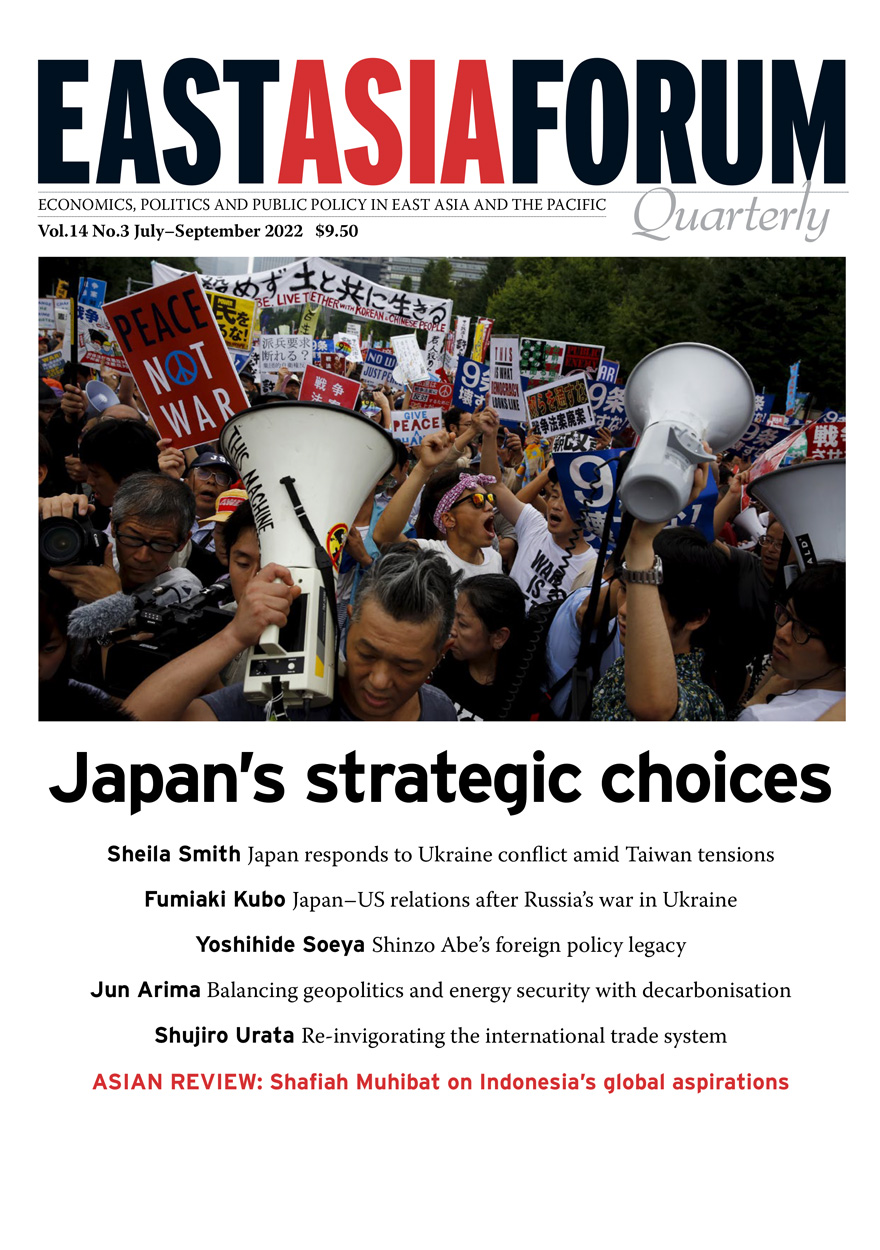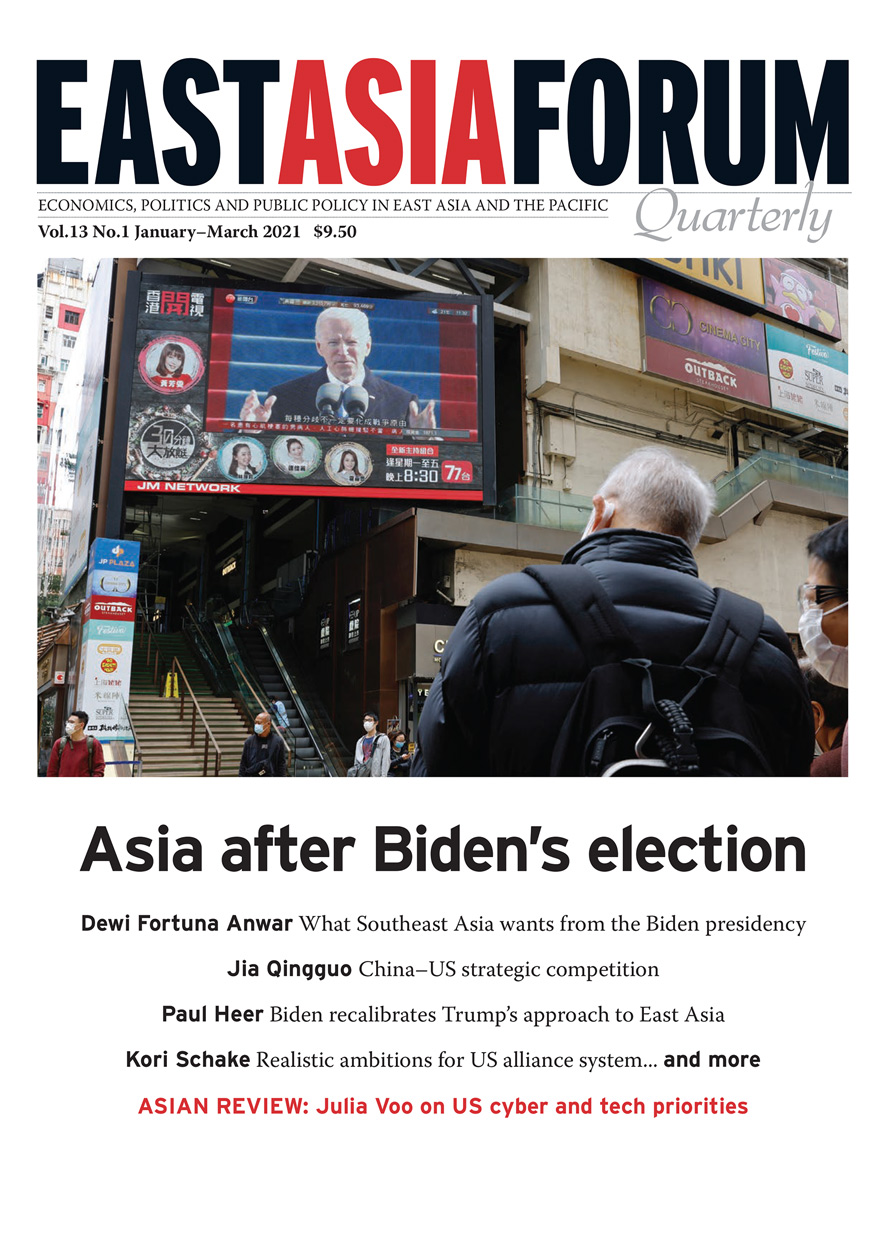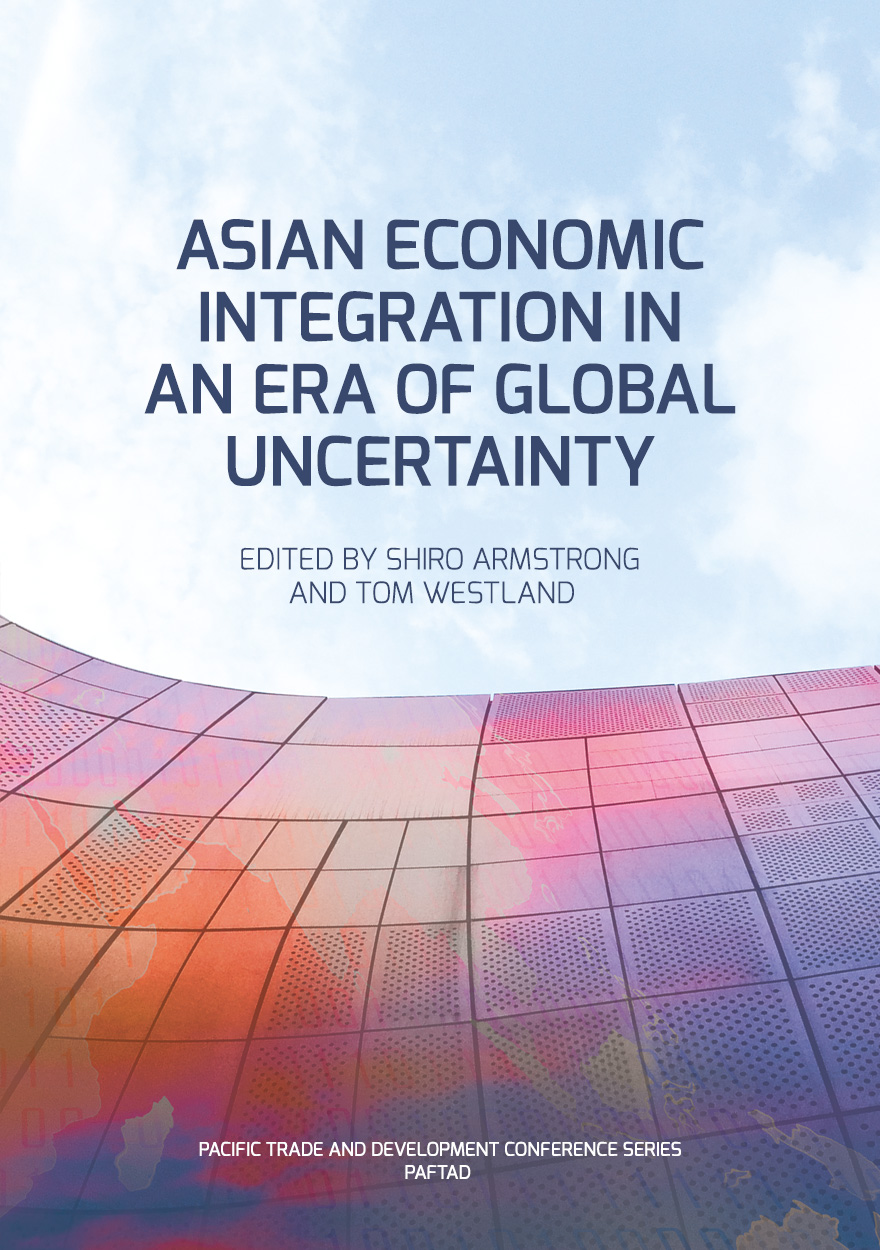Search titles
Displaying results 1 to 10 of 20.

East Asia Forum Quarterly: Volume 14, Number 3, 2022 »
Publication date: September 2022
Japan ‘crossed the Rubicon’ after Russia’s invasion of Ukraine. Unlike eight years ago when Russia annexed Crimea, the Kishida government quickly implemented sanctions against Russia with other Western countries. Japanese people have generally stood behind the Kishida government’s foreign and security policy activism, yet uncertainties about Japan’s future remain. Can Japan confront ‘a three-front war’ against China, North Korea and Russia? How can Japan manage its relations with the United States and China amidst great power competition and a growing risk of military conflict? How can it cope with inflation, energy shortages, global warming and the crisis of the nuclear non-proliferation regime? Domestically, Japan has yet to escape from the impact of COVID-19. Maintaining international competitiveness in an era of ageing and shrinking population remains a top priority for Japan. The articles in this EAFQ examine the challenges and opportunities facing Japan and explore its future in an era of growing uncertainty.
Download for free
Not available for purchase

East Asia Forum Quarterly: Volume 13, Number 4, 2021 »
Publication date: December 2021
Surrounded by great powers, South Korea has weathered the upheaval of the COVID-19 pandemic in its own unique way. Aspirations for greater autonomy and self-reliance are also driving significant changes to Seoul’s political and security postures amid intensifying regional tensions, and serve as a backdrop as South Koreans elect their next president in early 2022. This East Asia Forum Quarterly examines how South Korea is confronting the big challenges of our time, including public health, green energy, political polarisation, minority rights, denuclearisation on the Korean Peninsula and the global rise of K-pop.
Download for free
Not available for purchase

East Asia Forum Quarterly: Volume 13, Number 1, 2021 »
Publication date: March 2021
Few American administrations in living memory face as arduous a set of domestic and external policy challenges as that led by President Joseph R. Biden. What faces the new team in Washington is nothing short of herculean: arrest the scourge of COVID-19, grow the economy and begin once more to address the historic grievances of racial injustice and socioeconomic inequality. How it handles those tasks will profoundly affect its capacity to prosecute an effective foreign policy.
This issue of the Quarterly explores the monumental foreign policy challenges in Asia that await the Biden administration. Our contributors ponder the fate of the US–China trade war, the limits to achieving an ambitious national climate policy, the ongoing challenges on the Korean peninsula, in South and Southeast Asia, and the likely financial constraints on a more forward-leaning US military posture.
Download for free
Not available for purchase

In from the Cold »
Reflections on Australia’s Korean War
Publication date: March 2020
Open hostilities in the Korean War ended on the 27th of July 1953. The armistice that was signed at that time remains the poignant symbol of an incomplete conclusion – of a war that retains a distinct possibility of resuming at short notice.
So what did Australia contribute to the Korean War from June 1950 to July 1953? What were the Australians doing there? How significant was the contribution and what difference did it make? What has that meant for Australia since then, and what might that mean for Australia into the future?
Australians served at sea, on land and in the air alongside their United Nations partners during the war. They fought with distinction, from bitterly cold mountain tops, to the frozen decks of aircraft carriers and in dogfights overhead. This book includes the perspectives of leading academics, practitioners and veterans contributing fresh ideas on the conduct and legacy of the Korean War. International perspectives from allies and adversaries provide contrasting counterpoints that help create a more nuanced understanding of Australia’s relatively small but nonetheless important contribution of forces in the Korean War. The book finishes with some reflections on implications that the Korean War still carries for Australia and the world to this day.

East Asia Forum Quarterly: Volume 11, Number 4, 2019 »
Publication date: November 2019
The idea that countries can pursue prosperity and security as separate streams of the national interest has passed. Economics and security have always been enmeshed, although we assumed otherwise. The nature of the relationship between the two is changing fast. The narratives that surround the change find it difficult to keep up with the facts.
The world has become more multipolar, with remarkable growth outside the established powers in the North Atlantic. And big countries—not just the United States and China, but other G20 members like Brazil, Turkey, Russia and the United Kingdom—have become more nationalist and brazen in asserting what they perceive to be their economic and security interests over those of others. The US–China relationship is increasingly characterised by strategic competition in both the economic and security domains.
At the same time, digital technology has not just transformed products, firms and markets, it has opened them to cyber disruption and attack, resulting in a cross-over of security into the economic and social domains.
This issue of the East Asia Forum Quarterly explores what is happening, why and how to respond to the change. These essays argue for careful thought and active engagement by governments, business and the broader community. Genuine dialogue and problem-solving between the economic and security parts of universities and government is a good first step to frame the problem broadly, keep perspective and find solutions.
East Asia Forum Quarterly grew out of East Asia Forum (EAF) online, which has developed a reputation for providing a platform for the best in Asian analysis, research and policy comment on the Asia Pacific region in world affairs. EAFQ aims to provide a further window onto research in the leading research institutes in Asia, and to provide expert comment on current developments within the region. East Asia Forum Quarterly, like East Asia Forum online, is an initiative of the East Asia Forum and its host organisation, the East Asian Bureau of Economic Research in the Crawford School of Economics and Government in the College of Asia & the Pacific at The Australian National University.
Download for free
Not available for purchase

East Asia Forum Quarterly: Volume 10, Number 4, 2018 »
Publication date: October 2018
East Asia Forum Quarterly grew out of East Asia Forum (EAF) online, which has developed a reputation for providing a platform for the best in Asian analysis, research and policy comment on the Asia Pacific region in world affairs. EAFQ aims to provide a further window onto research in the leading research institutes in Asia and to provide expert comment on current developments within the region. The East Asia Forum Quarterly, like East Asia Forum online, is an initiative of the East Asia Forum (EAF) and its host organisation, the East Asian Bureau of Economic Research (EABER) in the Crawford School of Economics and Government in the College of Asia & the Pacific at The Australian National University.
Download for free
Not available for purchase

East Asia Forum Quarterly: Volume 10, Number 3, 2018 »
Publication date: August 2018
East Asia Forum Quarterly has grown out of East Asia Forum (EAF) online which over the past year has developed a reputation for providing a platform for the best in Asian analysis, research and policy comment on the Asia Pacific region in world affairs. EAFQ aims to provide a further window onto research in the leading research institutes in Asia and to provide expert comment on current developments within the region. The East Asia Forum Quarterly, like East Asia Forum online, is an initiative of the East Asia Forum (EAF) and its host organisation, the East Asian Bureau of Economic Research (EABER) in the Crawford School of Economics and Government in the College of Asia and the Pacific at The Australian National University.
Download for free
Not available for purchase

East Asia Forum Quarterly: Volume 10, Number 1, 2018 »
Publication date: March 2018
East Asia Forum Quarterly grew out of East Asia Forum (EAF) online, which has developed a reputation for providing a platform for the best in Asian analysis, research and policy comment on the Asia Pacific region in world affairs. EAFQ aims to provide a further window onto research in the leading research institutes in Asia and to provide expert comment on current developments within the region. The East Asia Forum Quarterly, like East Asia Forum online, is an initiative of the East Asia Forum (EAF) and its host organisation, the East Asian Bureau of Economic Research (EABER) in the Crawford School of Economics and Government in the College of Asia & the Pacific at The Australian National University.
Download for free
Not available for purchase

Asian Economic Integration in an Era of Global Uncertainty »
Edited by: Shiro Armstrong, Tom Westland
Publication date: January 2018
The Pacific Trade and Development (PAFTAD) conference series has been at the forefront of analysing challenges facing the economies of East Asia and the Pacific since its first meeting in Tokyo in January 1968.
The 38th PAFTAD conference met at a key time to consider international economic integration. Earlier in the year, the people of the United Kingdom voted to leave the European Union and the United States elected Donald Trump as their next president on the back of an inward-looking ‘America First’ promise. Brexit and President Trump represent a growing, and worrying, trend towards protectionism in the North Atlantic countries that have led the process of globalisation since the end of the Second World War.
The chapters in the volume describe the state of play in Asian economic integration but, more importantly, look forward to the region’s future, and the role it might play in defending the global system that has underwritten its historic rise. Asia has the potential to stand as a bulwark against the dual threats of North Atlantic protectionism and slowing trade growth, but collective leadership will be needed regionally and difficult domestic reforms will be required in each country.

East Asia Forum Quarterly: Volume 9, Number 3, 2017 »
Publication date: September 2017
East Asia Forum Quarterly grew out of East Asia Forum (EAF) online, which has developed a reputation for providing a platform for the best in Asian analysis, research and policy comment on the Asia Pacific region in world affairs. EAFQ aims to provide a further window onto research in the leading research institutes in Asia and to provide expert comment on current developments within the region. The East Asia Forum Quarterly, like East Asia Forum online, is an initiative of the East Asia Forum (EAF) and its host organisation, the East Asian Bureau of Economic Research (EABER) in the Crawford School of Economics and Government in the College of Asia & the Pacific at The Australian National University.
Download for free
Not available for purchase



